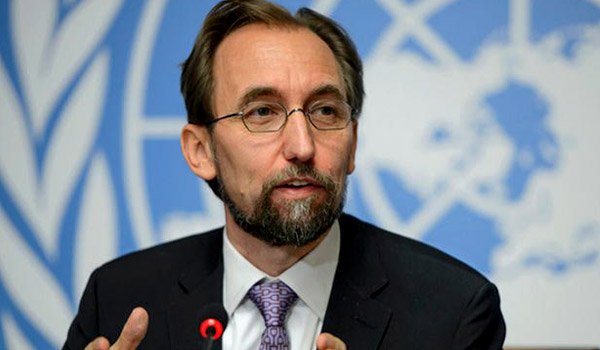The 32 nd session of the UN Huma Rights Council began on Monday here in Geneva and Prince Zeid made his oral update on the activities of his Office since the previous session to the full house, where representatives of all 193 member states of the UN were represented.
“In Sri Lanka, the government’s efforts to implement its commitment in resolution 30/1 will require a comprehensive strategy on transitional justice that enables it to pursue different processes in a coordinated, integrated and appropriately sequenced manner,” he said.
“This will require the inclusive and meaningful engagement of all Sri Lankans,” Prince Zeid said, adding that he would present “an oral update” on ‘progress’ made since October last year by Sri Lanka on the consensus resolution it co-sponsored on promoting reconciliation, accountability and Human Rights.
Sri Lanka’s Foreign Minister Mangala Samaraweera is also expected to make statement later in the session.
The thirty-second session of the Human Rights Council was declared opened by President of the Council Choi Kyong-lim.
A general debate will ensue, to be followed by a panel discussion on the occasion of the tenth anniversary of the Council with the participation of former Council presidents who are expected to reflect on their experiences in the Council, the achievements of the organisation over the decade and remaining challenges.
According to the agenda, the Council will hold a full-day annual discussion on Thursday on the human rights of women as well as a clustered interactive dialogue with the Working Group on transnational corporations and human rights and the Special Rapporteur on internally displaced persons.
“On 29 June, the Office of the High Commissioner for Human Rights will provide updates on the situations in Ukraine and Burundi, which will be followed by interactive dialogues. In the afternoon, other High Commissioner country reports and oral updates, on human rights situations in Sri Lanka and Myanmar, will be followed by a general debate,” the UNHRC said.
Sri Lanka co-sponsored the resolution (A_HRC_30_L.29) on promoting reconciliation, accountability and human rights in the island nation, the UNHRC encouraged Colombo to credibly investigate all human rights violations and alleged war crimes that were committed largely by the government forces during the final months of the war.
The consensus resolution, passed without a vote, urged Sri Lanka to develop a comprehensive plan and mechanism for preserving all existing records and documentation relating to human rights violations and abuses and violations of international humanitarian law.
The resolution requested the Office of the High Commissioner (OHCHR) to continue “to assess progress on the implementation of its recommendations and other relevant processes related to reconciliation, accountability and human rights, and to present an oral update to the Human Rights Council at its thirty-second session, and a comprehensive report followed by discussion on the implementation of the present resolution at its thirty-fourth session”.
It also encourages the Government of Sri Lanka to continue to cooperate with special procedure mandate holders, including by responding formally to outstanding requests.
Sri Lanka has taken some steps in accordance with the UNHRC resolution including the establishment of an Office of the Missing Person, the cabinet approval for the issuance of Certificate of Absence for 0ver 65,000 people missing during and after the war and nation-wide consultation on a new constitution and releasing of some lands in the Jaffna peninsula.
But both local and international say there are nothing but “token moves to tick boxes” ahead of the ongoing UNHRC sessions.
They say that the Colombo government has gone back on its commitment to implement many crucial provisions of the UN resolution it co-sponsored, by rejecting outright the foreign participation in the proposed judicial process on war-time abuses.
(ceylonews.com)






